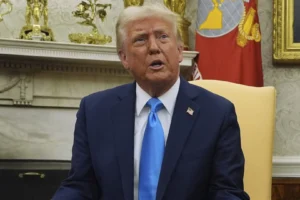Marathon CEO Fred Thiel said the company’s expansion continues unabated, and it plans to develop new mining sites in Texas.
The Texas Bitcoin mining bill that the industry didn’t think would make it out of committee did. Then it cleared the State Senate, too—each time with the backing of unanimous votes.
Despite the consternation from Bitcoin miners about the proposal that would cut into their earnings, Wednesday’s vote to send SB-1751 to the Texas House of Representatives happened in a mostly empty room during the local and uncontested session.
That means, so far, things are proceeding as Marathon Digital CEO Fred Thiel thought they would.
“In Texas, I’m confident that while this bill will likely pass the State Senate, I don’t think it’s going to make it out of the House intact,” he told Decrypt ahead of the vote.
If enacted, the legislation would curb benefits offered to Bitcoin miners in the state to reduce their power usage during times of high demand. In exchange for cutting their power usage to help the grid prioritize residential customers, Bitcoin miners have been among the commercial clients eligible to receive credits they can use toward their power bills.
And so far, the state has had a chummy relationship with Bitcoin miners. Lee Bracher, president of the Texas Blockchain Council industry group, told Reuters that Bitcoin miners consume roughly 2,100 megawatts—up 75% over the past year—and amount to roughly 3.7% of the state’s peak load.
Thiel said the company has been looking to diversify its operations and renewable power options, but added that “1751 won’t change our minds about Texas.”
Marathon, which trades on the Nasdaq under the MARA ticker, hosts the majority of its rigs—10 exahash of its total installed 14 EH—in several Texas facilities. Those facilities were run by Compute North until the company filed for Chapter 11 bankruptcy protection in September. Then in December, U.S. Bitcoin Corp. stepped in to replace Compute North at three of the facilities where Marathon hosts rigs.
That means Thiel could soon be a customer of Toronto-based Bitcoin miner Hut 8.
In February the publicly traded miner, which trades on Nasdaq under the HUT ticker, announced plans to merge with U.S. Bitcoin. Last month Hut 8 CEO Jaime Leverton said during an earnings call that the Canadian competition authority had issued a letter of no action, meaning there’s no regulatory hurdle to clear before the deal can close.
Leverton told Decrypt earlier this month during an interview for the gm podcast that she’s especially excited by the work that U.S. Bitcoin has done with artificial intelligence and machine learning to manage energy use and maintenance for individual rigs.
“We haven’t seen anything else quite like it,” she said. “And I think there’s a ton of potential as we get to the other side of this transaction, to really figure out how to scale and port some of that proprietary IP that they’re working on to other applications outside of just Bitcoin mining.”https://decrypt.co/cryptocom/bitcoin
But even if SB-1751 hasn’t changed Thiel’s mind on its growth in Texas, he said Marathon wants to keep diversifying its operations.
“We’re also expanding in North Dakota—we have a big site in North Dakota—that’s about 180 megawatts there that’s coming online as we speak,” he said. “But we still have lots of sites in Texas, and we’ll continue to develop those sites.”
The company has also started building out two $400 million mining facilities in the United Arab Emirates, a joint venture with FS Innovation in which Marathon has a 20% stake. The locations, which Thiel expects to go live before the end of this year, will have a combined 250-megawatt facility of capacity.
Thiel called the UAE venture Marathon’s “coming out party,” since it hasn’t previously done its own site design and development. Marathon usually places its rigs in hosted sites, run by other companies. But that could continue to change as Marathon looks at ways to set up more small, low-maintenance sites.
The goal, he said, is to look for places where Marathon can set up very small Bitcoin mining operations “at the edge,” or at the source of where renewable energy can be generated.
“Economically, that means you don’t have to have a lot of people on the small sites,” Thiel added. “We can essentially run a truck by every month or so to make sure everything’s running fine.”
Source: Decrypt










